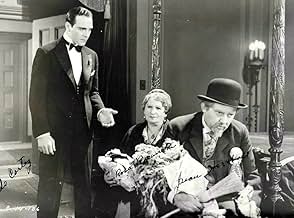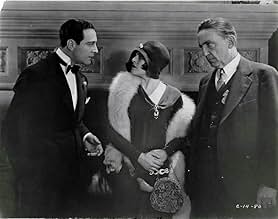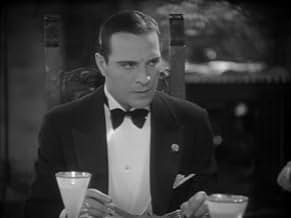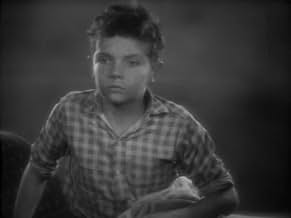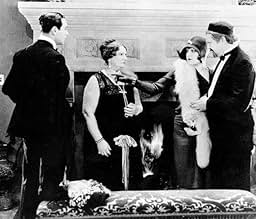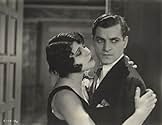VALUTAZIONE IMDb
6,3/10
420
LA TUA VALUTAZIONE
Aggiungi una trama nella tua linguaSoap-opera about a social-climbing Jewish man and his old-world parents who are heartbroken by his rejection of them.Soap-opera about a social-climbing Jewish man and his old-world parents who are heartbroken by his rejection of them.Soap-opera about a social-climbing Jewish man and his old-world parents who are heartbroken by his rejection of them.
- Regia
- Sceneggiatura
- Star
Syd Crossley
- Goldfish's Butler
- (as Sid Crossley)
Joe Bordeaux
- Crook
- (non citato nei titoli originali)
Ferike Boros
- Delancey Street Woman
- (non citato nei titoli originali)
Clarence Burton
- Police Desk Sergeant
- (non citato nei titoli originali)
Paul Ellis
- Crook
- (non citato nei titoli originali)
Ruth Feldman
- Market Woman
- (non citato nei titoli originali)
Otto Fries
- Tradesman
- (non citato nei titoli originali)
Julia Swayne Gordon
- Mrs. Striker
- (non citato nei titoli originali)
Donald Hall
- Minor Role
- (non citato nei titoli originali)
Leon Janney
- Eddie Lesser as a Boy
- (non citato nei titoli originali)
Julanne Johnston
- Irma Striker
- (non citato nei titoli originali)
Virginia Marshall
- Birdie Goldfish as a Girl
- (non citato nei titoli originali)
Recensioni in evidenza
I just had the opportunity to see this film on our most valuable classic film resource, TCM. It was good to see, purely for historic purposes regarding Frank Capra's career. One good thing about the silent parts is that if you had taped or Tivo'd the film, you can scan the silent scenes at double speed and still follow the story. One curious thing (stemming from the original story) stood out for me though; if I wanted to change my name from Goldfish to a classier name, I would surely change it to Gold instead of Fish! After all, Samuel Goldfish changed his name to Goldwyn. I say, when in doubt, keep the Gold and lose the Fish!
THE YOUNGER GENERATION (1929) starts as a silent film, complete with synchronized audio track (for music and sound effects), but eventually lapses into an early talkie with spoken dialogue. The scenes alternate between silent and sound throughout the duration of the film. It's an interesting curiosity for film history buffs, as the movie was released at seemingly the exact moment when Hollywood transitioned from silent cinema to talking pictures.
The story is nothing groundbreaking. The Goldfish family rises from the cultural melting pot of the Lower East Side to Fifth Avenue high society, thanks to son Morris (Ricardo Cortez), a shrewd businessman who grows the family furniture store into a successful antiques emporium.
Morris rules his family with an iron fist, forbidding his sister Birdie (Lina Basquette) from seeing her childhood sweetheart from the old neighborhood. The ritzy Fifth Avenue lifestyle stifles Papa Goldfish (Jean Hersholt), who misses his friends from Delancey Street. Morris even legally changes his surname from Goldfish to the less-Jewish "Fish" in order to distance himself from his family's ethnic heritage.
As an early talkie, many of the line readings are a bit awkward, though Basquette handles the dialogue better than the rest of the cast (even Cortez). But even with her naturalistic delivery, the lines are often written awkwardly.
Still, the human drama pulls at your heart. Financial success brings misery to the Goldfish family. Morris is a real jerk, and everyone else in his house suffers as he climbs the social ladder. Cut off from her family, Birdie stitches together a happy little life with her songwriter husband, while Morris obsesses over his social position and leads an ultimately empty existence. Lina Basquette is pretty cute as Birdie and Jean Hersholt's performance is heartbreaking.
The story is nothing groundbreaking. The Goldfish family rises from the cultural melting pot of the Lower East Side to Fifth Avenue high society, thanks to son Morris (Ricardo Cortez), a shrewd businessman who grows the family furniture store into a successful antiques emporium.
Morris rules his family with an iron fist, forbidding his sister Birdie (Lina Basquette) from seeing her childhood sweetheart from the old neighborhood. The ritzy Fifth Avenue lifestyle stifles Papa Goldfish (Jean Hersholt), who misses his friends from Delancey Street. Morris even legally changes his surname from Goldfish to the less-Jewish "Fish" in order to distance himself from his family's ethnic heritage.
As an early talkie, many of the line readings are a bit awkward, though Basquette handles the dialogue better than the rest of the cast (even Cortez). But even with her naturalistic delivery, the lines are often written awkwardly.
Still, the human drama pulls at your heart. Financial success brings misery to the Goldfish family. Morris is a real jerk, and everyone else in his house suffers as he climbs the social ladder. Cut off from her family, Birdie stitches together a happy little life with her songwriter husband, while Morris obsesses over his social position and leads an ultimately empty existence. Lina Basquette is pretty cute as Birdie and Jean Hersholt's performance is heartbreaking.
Morris Goldfish grew up on New York's poor Lower East Side with his Jewish family. His father is a fun loving guy with all his friends but they don't have much money. The kids accidentally burn down their home but Morris fights to save their valuables. He uses the same tenacity to be a successful business and moves the family to rich Fifth Avenue. His father is tired of the stuffy social climbing from Morris and not happy being no longer the head of the household while mother and sister Birdie are overjoyed with their rise in status. Morris changes him name from Goldfish to Fish.
This is my earliest Frank Capra film. It is silent except for some synchronized music and some talking sequences. It's always fascinating to see incremental advancements in technology. This mix of silent and sound is a real platypus. It actually affects the tone and the style of the movie. Of course, all of that is beyond the filmmaker's intention. It's just the sense from a modern viewer.
The father son relationship is pure Capra. It's a familiar Capra theme of money don't buy you happiness. I love the path that the movie is going on until Birdie and her boyfriend become the nexus of the plot in the middle. It's too much. Quite frankly, Morris can simply kick Birdie out for marrying poor. The whole crime is contrived. The movie does go back to the father son relationship which is a good thing. The big climatic moment in the lobby is both effective and flawed. There needs to be something more obvious for Morris to deny his parents. In the movie, he's already suppose to introduce his parents to the upper crust guests during the dinner. It needs an extra push. It needs his guest to say something derogatory about them being poor. It's a great moment but it needs a better reason for Morris. Overall, the movie gets a bit too melodramatic. This is a great film for Capra fans and they would be very familiar with the theme.
This is my earliest Frank Capra film. It is silent except for some synchronized music and some talking sequences. It's always fascinating to see incremental advancements in technology. This mix of silent and sound is a real platypus. It actually affects the tone and the style of the movie. Of course, all of that is beyond the filmmaker's intention. It's just the sense from a modern viewer.
The father son relationship is pure Capra. It's a familiar Capra theme of money don't buy you happiness. I love the path that the movie is going on until Birdie and her boyfriend become the nexus of the plot in the middle. It's too much. Quite frankly, Morris can simply kick Birdie out for marrying poor. The whole crime is contrived. The movie does go back to the father son relationship which is a good thing. The big climatic moment in the lobby is both effective and flawed. There needs to be something more obvious for Morris to deny his parents. In the movie, he's already suppose to introduce his parents to the upper crust guests during the dinner. It needs an extra push. It needs his guest to say something derogatory about them being poor. It's a great moment but it needs a better reason for Morris. Overall, the movie gets a bit too melodramatic. This is a great film for Capra fans and they would be very familiar with the theme.
Based on a play by Fannie Hurst, The Younger Generation might be Frank Capra's most personal film up to this point. We've had films that felt like he was just for hire (Submarine and both the Harry Langdon films) and films where he was saying what he wanted to say (pretty much everything else to one degree or another), but this almost feels somewhat autobiographical. Sure, Capra was Italian and not Jewish, but it's about the immigrant experience and the difference between people who came to America as adults and those who were raised on its streets. Well, Capra was raised on those streets and had parents who moved to America as adults (he emigrated from Italy with his family when he was five years old), so this just feels like it should be personal.
The Goldfish family is living on the East Side of New York City while the mother Tilda (Rosa Rosanova) tries to make a living, the father Julius (Jean Hersholt) makes jokes with his friends on the street corner, little Birdie (Lina Basquette as an adult) makes friends with the boy across the way Eddie (Rex Lease as an adult), and the boy Maurice (Ricardo Cortez as an adult) with a real drive for business. When Maruice gets into a fight with Eddie, Maruice accidentally hits the oil lamp above the stove, sending the apartment up in a blaze, but he's not put out by it. He'll make money from their leftover possessions, setting the stage for him to build an import art empire roughly fifteen years later.
The core of the film's story is the implied conflict between the younger and older generations, but it's not quite the simplistic battle of the ages that that implies. Instead, it's a conflict of visions that mostly manifests as the dramatic butting of heads between Maurice and Birdie since the brother is obsessed with status and position in his new life while Birdie has kept up her relationship with Eddie to the point that she wants to marry him.
It's interesting to see the big guy versus little guy dynamic manifest here within a family unit with Maurice becoming the big guy, losing sight of his own humanity, and pushing away everyone else while controlling them with his money, much to the chagrin of everyone else in the family, in particular Julius and Birdie who act like partners in crime. Things turn when Eddie, in a fit of desperation to be good enough for Birdie in Maurice's eyes (I think, this is thin and needs more, to be honest), he helps some local hoods knock off a jewelry story by riding up on the street and singing a song to offer up a distraction. It's a scandal that gets quickly found out, leading to Birdie rededicating her love to him by marrying him and Maurice kicking her out while preventing his parents from knowing that he'd done it.
Now, I should comment on the fact that this is Capra's first sound film. Well, partial sound film. I don't know the background for sure, but it seems like it was at least mostly filmed, The Jazz Singer came out, and they went back to film four scenes with the new sound technology. The transition from silent to sound is the most interesting period in film, in my opinion, and one measure of a director's ability to adapt to changing circumstances. John Ford failed it with The Black Watch while Ernst Lubitsch passed with flying colors in The Love Parade. Capra falls more towards the Lubitsch side, though being only a part talkie there are limits to what one can say on that front. I just want to note that the four scenes are dialogue heavy scenes (similar to Hitchcock's first effort at sound, Blackmail), but he films it like any competent dialogue scene from the later pre-Code period would be filmed, complete with dialogue cutting into shots with people who aren't talking, helping to blend shots confidently. It's surprisingly well done stuff, and it happens to be in a pretty good story to boot. In terms of part-talkies, it recalled the confident way that William Wyler approached it in The Love Trap.
Anyway, the film speeds towards its conclusion after the passage of two years with Eddie in jail, Birdie having his child, and Julius reaches a low point in his health without any contact from his beloved daughter because Maurice is tearing up her letters all leading to the kind of warm-hearted resolution that Capra was known for, though this is tinged with some pointed sadness. It's not entirely happy, Maurice's antagonism towards Birdie gets somewhat resolved but he can't be happy, not even with his money. And that points to what has quickly formed to be Capra's running theme: the little guys prioritize things that the big guys don't, but there are things to be learned across that gap.
It's not a great film, perhaps more interesting for Capra's first foray into sound more than anything else, but it's a solidly entertaining little melodrama that never elevates the material but executes it with some skill.
The Goldfish family is living on the East Side of New York City while the mother Tilda (Rosa Rosanova) tries to make a living, the father Julius (Jean Hersholt) makes jokes with his friends on the street corner, little Birdie (Lina Basquette as an adult) makes friends with the boy across the way Eddie (Rex Lease as an adult), and the boy Maurice (Ricardo Cortez as an adult) with a real drive for business. When Maruice gets into a fight with Eddie, Maruice accidentally hits the oil lamp above the stove, sending the apartment up in a blaze, but he's not put out by it. He'll make money from their leftover possessions, setting the stage for him to build an import art empire roughly fifteen years later.
The core of the film's story is the implied conflict between the younger and older generations, but it's not quite the simplistic battle of the ages that that implies. Instead, it's a conflict of visions that mostly manifests as the dramatic butting of heads between Maurice and Birdie since the brother is obsessed with status and position in his new life while Birdie has kept up her relationship with Eddie to the point that she wants to marry him.
It's interesting to see the big guy versus little guy dynamic manifest here within a family unit with Maurice becoming the big guy, losing sight of his own humanity, and pushing away everyone else while controlling them with his money, much to the chagrin of everyone else in the family, in particular Julius and Birdie who act like partners in crime. Things turn when Eddie, in a fit of desperation to be good enough for Birdie in Maurice's eyes (I think, this is thin and needs more, to be honest), he helps some local hoods knock off a jewelry story by riding up on the street and singing a song to offer up a distraction. It's a scandal that gets quickly found out, leading to Birdie rededicating her love to him by marrying him and Maurice kicking her out while preventing his parents from knowing that he'd done it.
Now, I should comment on the fact that this is Capra's first sound film. Well, partial sound film. I don't know the background for sure, but it seems like it was at least mostly filmed, The Jazz Singer came out, and they went back to film four scenes with the new sound technology. The transition from silent to sound is the most interesting period in film, in my opinion, and one measure of a director's ability to adapt to changing circumstances. John Ford failed it with The Black Watch while Ernst Lubitsch passed with flying colors in The Love Parade. Capra falls more towards the Lubitsch side, though being only a part talkie there are limits to what one can say on that front. I just want to note that the four scenes are dialogue heavy scenes (similar to Hitchcock's first effort at sound, Blackmail), but he films it like any competent dialogue scene from the later pre-Code period would be filmed, complete with dialogue cutting into shots with people who aren't talking, helping to blend shots confidently. It's surprisingly well done stuff, and it happens to be in a pretty good story to boot. In terms of part-talkies, it recalled the confident way that William Wyler approached it in The Love Trap.
Anyway, the film speeds towards its conclusion after the passage of two years with Eddie in jail, Birdie having his child, and Julius reaches a low point in his health without any contact from his beloved daughter because Maurice is tearing up her letters all leading to the kind of warm-hearted resolution that Capra was known for, though this is tinged with some pointed sadness. It's not entirely happy, Maurice's antagonism towards Birdie gets somewhat resolved but he can't be happy, not even with his money. And that points to what has quickly formed to be Capra's running theme: the little guys prioritize things that the big guys don't, but there are things to be learned across that gap.
It's not a great film, perhaps more interesting for Capra's first foray into sound more than anything else, but it's a solidly entertaining little melodrama that never elevates the material but executes it with some skill.
In this film, we see Morris Goldfish (Ricardo Cortez) bring success to his Jewish family, first as a young newspaper boy in New York City, and later a very successful, ambitious businessman. His mother (Rosa Rosanova) sees his skills, and encourages him, but the father and sister miss their old ramshackle home and old friends on the lower east side. This is one of the crossover films, where the soundtrack technology was invented while the film was being made. About halfway through the film, it switches from a silent film with title cards into a talking picture with sound track. Then it goes back to using title cards until the very end, with the final scene using sound again. Most of the cast had been making silent films for years, so they probably had to adjust to the sound portions. Good job by most of the cast. Papa Goldfish (Jean Hersholt) spends most of the film lamenting their new high-society lifestyle, and it gets annoying after a while. He won't even be happy when one of his kids gets engaged and married. We watch as Morris gets more and more successful, and he treats his own family very badly. Most of the story is told in dialogue, and after the big, grand opening, it looks like the rest was filmed in one room. This came out just before the big money crash of 1929, so we can assume that Morris will get what he deserves later, even if this story ends mostly on a sad note.
Lo sapevi?
- QuizFirst part-dialog sound film for Columbia Pictures and director Frank Capra. Both wanted to make an all-talking film, but equipped sound stages were at a premium at the time.
- BlooperWhen Birdie tells Eddie (via intertitle) that his song has been sold for $1000, he excitedly mouths the words "Five thousand?"
- Citazioni
Title Card: New York's Lower East Side--a melting pot, where the younger generation struggles to free itself from the old-world ideas of its fathers.
- ConnessioniFeatured in Frank Capra's American Dream (1997)
I più visti
Accedi per valutare e creare un elenco di titoli salvati per ottenere consigli personalizzati
Dettagli
- Data di uscita
- Paese di origine
- Lingua
- Celebre anche come
- The Younger Generation
- Luoghi delle riprese
- Azienda produttrice
- Vedi altri crediti dell’azienda su IMDbPro
- Tempo di esecuzione
- 1h 15min(75 min)
Contribuisci a questa pagina
Suggerisci una modifica o aggiungi i contenuti mancanti

